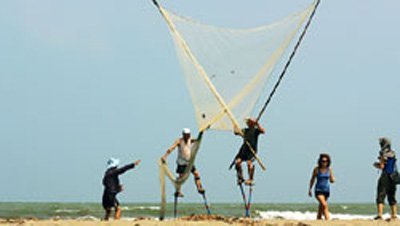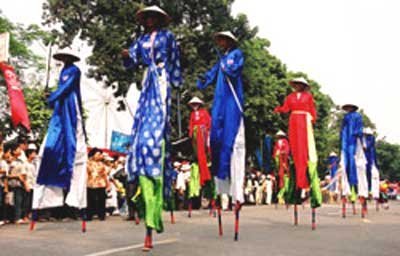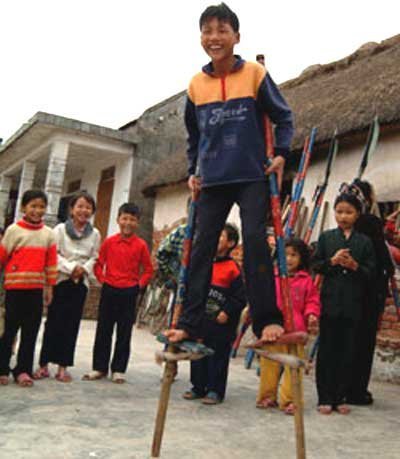
|
| Wade into the water: Foreign tourists enjoy watching local fishermen walking on stilts to catch shrimp and fish on the shore. – File Photo |
But in this spot the fishermen have more than one hook on their line. They are also famous for their stilt performances. We are told on our arrival there is a rehearsal on the afternoon for a village festival.
We follow Luong Tuyet Mai to a place where 10 men stand high on 3m bamboo stilts, like giants among their fellow villagers.
Mai tells us stilts were initially used to allow fishermen to walk into deep water off the coast to catch shrimp. The men learn the art at a very young age and become very agile.

|
| Steady does it: Quan Vinh stilt walkers during a parade at the Ha Noi International Tourism Festival. (Photos: VNS) |
Mai then takes us to the shore to watch the stilt walkers catch shrimp and fish, working in a team similar to the performance we just saw.
Nghia Hung District was once a natural bog inaccessible to sail boats, which was why the stilts were so useful. Today they are an environmentally friendly alternative to engine-powered boats, with some fishermen so adept they can venture into water 10m deep.
The villagers are eager to teach the young city folk how to master the stilts so the male members of our group are hoisted on to small versions of the bamboo poles, but they look like they are about to fall. Most of them beg to get down after a short time.
I am told that only the men learn to use these stilts as it's strongly linked to fishing traditions and seen as too risky for women.
Mai tells me she was never taught stilt skills.
"That's why I must study and work in a big city," she jokes.
Mai's father informs me, however, that his stilt performances and fishing have allowed him to raise four children who have all studied at universities in Ha Noi.

|
| Towering tall: A boy practises standing on stilts. Local men in Quan Vinh Village learn the art of stilt walking at a very young age. |
Mai uses a bamboo pole with a flat metal bar which is dragged across the muddy surface to find clams under the mud. We all have a go, with Mai catching two to our one.
Returning to her house, we clean and cook the clams, and eat them with chicken raised in her garden and home-grown vegetable.
I don't know whether the food tastes so sublime because it is fresh or we have worked so hard to catch the clams, but after only one day in this quiet, warm village, I find myself in love with the atmosphere, peaceful landscape and laid-back coastal lifestyle.
Tomorrow will be another day on our tour around the northern province but after just one day here in Quan Vinh Village. I don't want to leave.
VietNamNet/Viet Nam News